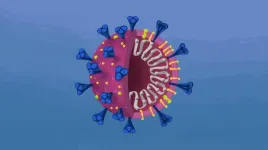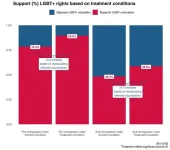(Press-News.org) Washington, D.C. — Sept. 13, 2023 — The American Society for Microbiology today released consensus recommendations from a workshop of leading scientists who reviewed the benefits and risks of “gain of function” research, as well as related policies and procedures, and proposed a foundation to guide discussions and improve oversight moving forward.
The recommendations – together with a call to action for the scientific community and the general public – are intended to inform assessments of “gain of function research of concern,” which makes up a small fraction of all biological research. Such scientific inquiry, sometimes called enhanced potential pandemic pathogen (ePPP) research, involves the study of pathogens that are modified to give them new abilities, typically to better understand the biology of a microbe or to enable its use for treatment and prevention of disease.
In recent years, the dialogue in the public sphere has focused on potential risks to society associated with ePPP experiments. To maintain a balanced scientific discussion between risks and the need to keep society safe from existing and future threats, the American Society for Microbiology convened a panel of leading scientists representing diverse experiences, perspectives, expertise and opinions. Research with infectious agents has provided considerable societal benefits in the development of vaccines and therapeutics. But a very small subtype of it has also introduced concerns about the potential for negative impacts of modified pathogens on public health, such as through biosafety and biosecurity risk.
“Because policies that impact scientific research can have long-lasting and often unforeseen ramifications on public health and society, the American Society for Microbiology was compelled to seek insights that could help inform current and future policy deliberations,” said Michael Imperiale, chair of the ASM workshop steering committee and a professor of microbiology and immunology at the University of Michigan. These recommendations from leading experts with various viewpoints provide a foundation with which to assess scientific inquiry and the efforts to shape that inquiry.”
Convening earlier this year, scientists from the University of Michigan, Johns Hopkins School of Public Health, Stanford University, St. Jude’s Children Hospital, University of Wisconsin-Madison, the University of Pennsylvania and elsewhere agreed to recommend:
The need for standardized research terminology and practices: Clear definitions will allow the scientific community to gain a better understanding of the advantages and disadvantages of a proposed experiment. Standardization of biorisk management protocols and practices for both the U.S. and international communities is also needed.
Increased engagement and transparency with the public on infectious agents research: Scientists need to acknowledge risks more clearly and candidly and explain and justify why using a perceived risky approach is necessary to answer certain research questions. Scientists also must do a better job of communicating procedures in place to perform experiments safely.
Strengthened biorisk management systems for safe, secure and responsible research: Increased multi-stakeholder dialogue on risk-benefit considerations for ePPP research, along with funding for research on biosafety measures, biorisk management training, occupational medicine services, improved facilities and protocols, and personal protective equipment can ensure biorisk management is taken more seriously and effectively across institutions and laboratories. Such discussions must also include the issue of potential risks to the greater public.
“As the world emerges and learns from the COVID-19 pandemic, we must build a research enterprise and oversight framework aimed at anticipating, preventing, and responding to disease outbreaks of all types, in a thoughtful manner,” said David Relman, professor of medicine and of microbiology and immunology at Stanford University. “It is not a question of “if” but “when” the world will face another pandemic. Science can provide key insights and critical countermeasures in the effort to protect ourselves against and respond to pandemics. At the same time, we need to ensure that science itself does not give rise to the next pandemic.”
While the workshop left unresolved the issues of what types of ePPP experiments are justified, none of the scientists suggested a blanket halt to all such studies. Instead, they issued a multi-part call to action for the scientific community and the general public. Moreover, it was acknowledged that certain experiments should not be performed: each situation will be unique and will require thoughtful consideration.
The scientific community should revisit the current pathogen oversight frameworks to determine what types of decisions about infectious agent research are appropriately made at the institutional level and what should be elevated and decide on who is most qualified to make such decisions, workshop participants wrote.
The general public, participants wrote, should advocate for evidence-informed policies while supporting research on the effectiveness of biosafety measures, training and reporting.
Workshop participants included Michael J. Imperiale, Ph.D. University of Michigan, Arturo Casadevall, M.D., Ph.D., Johns Hopkins Bloomberg School of Public Health, Stacey Schultz-Cherry, Ph.D., St. Jude Children’s Hospital, Vanessa Sperandio, Ph.D., University of Wisconsin-Madison, Susan R Weiss, Ph.D., University of Pennsylvania, Ron Fouchier, Ph.D., Erasmus Medical Center, Gigi Gronvall, Ph.D., Johns Hopkins University, Jo Handelsman, Ph.D., University of Wisconsin-Madison, Joseph Kanabrocki, Ph.D., University of Chicago, Filippa Lentzos, Ph.D., King’s College London, Marc Lipsitch, D.Phil., Harvard University, Megan Palmer, Ph.D, Ginkgo Bioworks, Stanley Perlman, M.D., Ph.D., University of Iowa, Angela Rasmussen, Ph.D., University of Saskatchewan, David Relman, M.D., Stanford University, Kanta Subbarao, M.B.B.S., MPH, WHO Collaborating Centre for Reference and Research on Influenza and the University of Melbourne.
The full report and recommendations can be found here.
###
The American Society for Microbiology is one of the largest professional societies dedicated to the life sciences and is composed of 30,000 scientists and health practitioners. ASM's mission is to promote and advance the microbial sciences.
ASM advances the microbial sciences through conferences, publications, certifications, educational opportunities and advocacy efforts. It enhances laboratory capacity around the globe through training and resources. It provides a network for scientists in academia, industry and clinical settings. Additionally, ASM promotes a deeper understanding of the microbial sciences to diverse audiences.
END
American Society for Microbiology announces ‘gain of function’ recommendations from top scientists
2023-09-13
ELSE PRESS RELEASES FROM THIS DATE:
Scientists uncover COVID’s weakness
2023-09-13
New UC Riverside research has revealed COVID’s Achilles heel — its dependence on key human proteins for its replication — which can be used to prevent the virus from making people sick.
In a new paper published in the journal Viruses, the UCR research team describes an important discovery. The protein in COVID that enables the virus to make copies of itself, called N, requires the help of human cells to perform its job.
Genetic instructions in our cells are transcribed from DNA to messenger ...
UMass Amherst and Embr Labs develop ‘digital drug’ to predict hot flashes
2023-09-13
Researchers at the University of Massachusetts Amherst’s Institute for Applied Life Sciences (IALS) and Embr Labs have created a machine-learning algorithm to predict a hot flash before a person perceives it.
When combined with Embr Labs’ patented wearable device, Embr Wave™, immediate cooling is delivered to mitigate or fully alleviate the event. This first-of-its-kind predictive algorithm is the result of machine learning being applied to the largest data set of digital biomarkers for hot flashes ever collected, which was generated by researchers at UMass Amherst’s Center for Human ...
Socioeconomic status may be an uneven predictor of heart health
2023-09-13
Research Highlights:
The benefits of four measures of socioeconomic status (education, income, employment status and health insurance) on ideal heart health were greater for non-Hispanic white adults compared to Black, Hispanic and Asian adults in the U.S.
The new diverse representative study suggests heart disease prevention efforts should address other non-biological factors that drive cardiovascular health and not rely solely on reducing socioeconomic disparities by race or ethnic group.
Embargoed until 4 a.m. CT/5 a.m. ET Wednesday, Sept. 13, 2023
DALLAS, ...
No increase in cancer risk for most patients with reflux disease
2023-09-13
Reflux disease manifests as acid regurgitation and heartburn and is a known risk factor for oesophageal cancer. However, a new study published in The BMJ by researchers at Karolinska Institutet now reports that the majority of patients do not have a higher risk of cancer. A large-scale study from three Nordic countries shows that the cancer risk is only elevated in patients whom gastroscopy reveals to have changes in the oesophageal mucosa.
“This is a gratifying result since reflux disease is a very common condition and most patients are found to have a completely normal mucus membrane on gastroscopic examination,” says the study’s ...
Study uncovers link between anti-immigrant prejudices and support for LGBT+ rights
2023-09-13
Cross-national research carried out by the University of Southampton and Vrije Universiteit Amsterdam (VUA) into public opinion on LGBT+ rights has shown that anti-immigrant prejudices, particularly towards Muslims, contributes to explaining some of the widespread shifts in tolerance towards the LGBT+ community. Findings of a new study show this was especially evident among socially conservative voters.
The rise of tolerance towards LGBT+ individuals in Western democracies could be seen as remarkable, according to the researchers. Whereas a majority of citizens rejected the idea of same-sex marriage a couple of decades ago, a majority of ...
Rapid acting, oral vaccines are coming soon
2023-09-13
A new paper in Biology Methods and Protocols, published by Oxford University Press, indicates that researchers studying SARS-CoV-2 may have developed new methods to administer vaccines orally, which would be both easier to administer and more effective at combatting illnesses.
The best way to neutralize viruses is before they can enter inside human cells but are only on the external surface of epithelial cells that line and produce mucus in the lungs, nose, and mouth. A specific class of antibodies known as Immunoglobulin A operate in mucus and can disable viruses. However, production of specific immunoglobulins/antibodies for a ...
Certain proteins in breast milk found to be essential for a baby’s healthy gut
2023-09-13
More than 320 million years of mammalian evolution has adapted breast milk to meet all the physiological needs of babies: it contains not only nutrients, but also hormones, antimicrobials, digestive enzymes, and growth factors. Furthermore, many of the proteins in breast milk, for example casein and milk fat globule membrane proteins, aren’t just sources of energy and molecular building blocks, but also directly stimulate immunity, at least under preclinical conditions.
Likewise, the gut microbiome, composed of bacteria, archaea, and fungi, plays a vital role in the regulation of the immune system. This raises the possibility that the immune-boosting function ...
AACR Cancer Progress Report details exciting advances in cancer research and treatment
2023-09-13
PHILADELPHIA – Today, the American Association for Cancer Research (AACR) released the 13th edition of its annual Cancer Progress Report, which chronicles how basic, translational, and clinical cancer research and cancer-related population sciences—primarily supported by federal investments in the National Institutes of Health (NIH) and the National Cancer Institute (NCI)—remain vitally important to improving health and saving lives.
In addition to providing the latest statistics on cancer incidence, mortality, and survivorship, the AACR Cancer Progress Report 2023 offers detailed updates and important ...
Pitt surveillance system detected infection linked to eye drops months before outbreak declared
2023-09-13
An infectious diseases surveillance system created by University of Pittsburgh School of Medicine scientists and deployed at a UPMC hospital successfully flagged cases of a drug-resistant infection spread by eye drops months before national public health officials announced an outbreak.
The findings, published today in The Journal of Infectious Diseases, were obtained through a hospital-based program called Enhanced Detection System for Healthcare-Associated Transmission (EDS-HAT). They demonstrate the potential of this technology to detect and stop nationwide outbreaks sooner.
“Our study really showcases the utility of whole genome sequencing surveillance,” ...
Early ovary removal likely to accelerate aging process and health problems
2023-09-13
CLEVELAND, Ohio (Sept 13, 2023)—Increasing concerns regarding potentially harmful long-term effects of premenopausal bilateral oophorectomy (PBO) have caused a decline in the number of women choosing to proactively remove both ovaries as a precaution to protect against ovarian cancer. A new study identified specific chronic medical conditions, such as asthma and arthritis, associated with the procedure. Results of the study are published online today in Menopause, the journal of The Menopause Society.
Hysterectomy is the second-most-frequently performed surgical operation for women after cesarean ...



